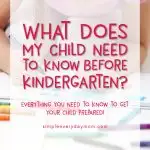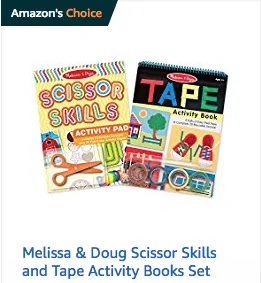Inside: If you keep asking yourself, “What should my child know before kindergarten?”, don’t worry. This guide takes you through step by step on all the skills they need to succeed in kindergarten.
When a child walked in the door of their school 40 years ago, it was typically their first foray into the world of education. Up until that point, they were raised at home by a non-working parent or grandparent.
The modern kindergartener, however, is a seasoned veteran when it comes to spending time in the care of teachers. Many have been in preschool or daycare for at least one year, and some for as many as five years, before even setting foot in the door of their kindergarten classroom.
Still, one question is on the lips of every parent when they register their child for Kindergarten.
What should my child know before kindergarten?
Every school is different, however, there are some very necessary skills that every child should master before getting on that big yellow bus.
The skills can be broken down into three groups: Personal Care Skills, Social Skills, and Academic Skills.

Academic Skills
This is the area that most people think of when they ask, “What does my child need to know before going to Kindergarten?”
While it is a very important area, it is probably the least indicative of success in the classroom and will have the broadest range of ability on the first day.
And remember, studies have shown that the single most important way you can help your child prepare for academic success is to read with them.
- Letter Identification – Many children can master recognizing all the uppercase and lowercase letters by the beginning of Kindergarten. Not there yet? Try these fun activities.
- Name Identification – An important skill, it helps children identify where to sit, where they can put their belongings, what small group they are in, and more. This free printable is fun & teaches them their name.
- Number Identification – Many schools now have electronic student identification numbers that are used for everything from logging into a computer, taking out a library book, and buying lunch. A game like this will help your child learn to identify numbers and one to one correspondence.
- Color Identification – Another handy skill as many times teachers group non-readers into color-coded groups. It also helps if they need to find their blue coat or the green book. These will help your child learn the basic colors quickly. Another way to help kids learn colors is by talking about the names of colors while coloring pages (like these free Disney coloring pages or these Star Wars coloring pages).
- Scissor Skills – Children of this age should be able to hold scissors properly and cut out simple shapes. Need to build up this skill? Have them practice with these Star Wars cutting practice worksheets.
This scissor activity set is Amazon’s top choice and is loaded with cool cutting activities (and kid-safe scissors) to teach your child and have fun at the same time!
- Pencil Grasp – By age 5, children should change from a Palmar grasp to a 5 finger pencil grasp, or even a tripod pencil grasp. This skill aids in learning handwriting skills, and as a bonus, build up the fine motor muscles in the hands.
✅ Tip: These little tools are super handy at helping children form a better pencil grasp.
Social Skills
Having social skills isn’t just about being the most popular kid in Kindergarten.
This is a wonderful and forgiving age for trying out new social skills. Working cooperatively is an ever-growing skill as we grow and develop.
Here are the most important ones for children in Kindergarten:
- Sharing – not every child has siblings at home, and sharing is a pretty big concept. In school, children need to share materials, space, and even the teacher’s attention. If your child is struggling, practice this skill at home by asking to play with a favorite toy. Be sure to reinforce the fact that you will give the toy back in a short while.
- Taking Turns – Just like sharing, children need to learn that they cannot always be first, nor can they barge ahead of others. A great way to practice turn-taking is with developmentally appropriate board games! This is also a fun way to reinforce following directions, playing fairly, winning politely and losing gracefully.
- Following Rules – School has a lot of rules. Children are expected to follow rules for safety, for using materials, and in different situations such as the cafeteria and playground. Try playing one of these fun preschool board games to help kids learn all about rules.
- Following Directions – By age 5, most children can follow 2 and 3 step directions. This skill is essential for classroom success. If your child is struggling with this skill, practice at home by asking them to do some “First-Next” things with you. “First, put on your coat. Next, bring me my shoes please!”
- Task Perseverance– Developmentally speaking, children of Kindergarten age should be able to sit and pay attention to a short picture book, play with a toy for at least five minutes, or engage in a conversation for five minutes or longer. Please note: this does not include electronics.
Personal Care Skills
Think about how it feels when you are trying to rush to go out with your child on a cold winter’s day.
You need to make sure that he has his hat, gloves, boots, and coat on, as well as yourself. Now multiply that by 20.
Teachers simply cannot spend that amount of time helping every child get ready before an already-too-short recess. That’s why these skills top the charts of what teachers need their students to accomplish independently!
- Toileting – No bones about it, your child needs to wipe their own bottom by this point, as well as zip, button, or snap their pants. Many schools do not even allow the teacher in the restroom with the children for legal reasons.
- Hand Washing – Schools are a hotbed of germs. Unless you enjoy trips to the pediatrician, teaching all the steps of handwashing and reinforcing it at home is at least one thing you can do to prevent your child from bringing home every virus that enters the classroom.
- Donning Outerwear – zipping coats, putting fingers in gloves, and buttoning sweaters are all important tasks to master! Be sure to select clothing with easy fasteners whenever possible, such as Velcro shoes or mittens, and practice difficult clothing at home.
Toys like this one help kids learn fine motor skills while having fun.
- Responsibility for Belongings – It’s time to teach your child how to be responsible for their own items while you are out. You won’t be there to remind your child to grab their backpack, so it’s best to get them on top of it early! Self-sufficient children are more confident in the classroom as well.
If your child hasn’t accomplished all these things, don’t worry.
Kindergarten teachers are well trained to deal with a variety of abilities. If your child continues to struggle, reach out to the school in advance to see if they have suggestions as well.
Fun Activities For Kids

Sam is the crafter and founder of Simple Everyday Mom. She has been featured in Oprah Mag, Good Housekeeping, The Spruce Crafts, Country Living, The Bump and more. Read more.



Migs
Saturday 3rd of February 2018
Children should also be able to loose gracefully. Allowing children to loose and work through their emotions is very important. They must realize that people loose more often than they win.
Sam T
Saturday 3rd of February 2018
Oh, yes! Such a good tip. We're currently trying to teach that to our 7 year old. I guess we missed the mark ?